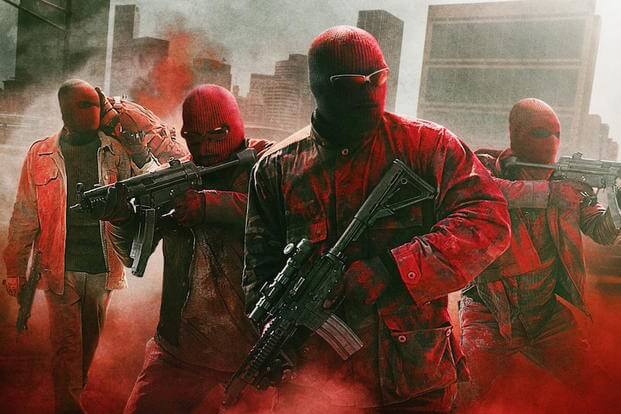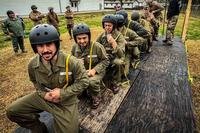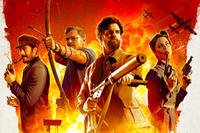Triple 9 (now in theaters) tells a story that's familiar to fans of crime thrillers: it's a movie about a gang of bad cops in Atlanta who pull off a big heist and how an obsessive good cop keeps them from getting away with it. Except, this time, many of the bad cops are veterans with tactical training and the good cop is a veteran battling post traumatic stress.
Director John Hillcoat (Lawless, The Road) worked closely with screenwriter Matt Cook, who brings his experiences as an Army veteran of the war in Iraq to the story. Matt's screenplay has been kicking around Hollywood for a while, having been named to the 2010 Black List, an annual survey of the best unproduced scripts in the movie business.
The movie attracted an impressive list of actors: Casey Affleck gives another great performance as the good cop with PTS, Woody Harrelson is his mentor on the force, Kate Winslet runs the Russian mob that's behind the heist and the criminal/cop crew includes Chiwetel Ejiofor, Anthony Mackie, Norman Reedus, Aaron Paul and Clifton Collins, Jr. Michael Kenneth Williams shows up in drag and Gal Gadot (Wonder Woman in the upcoming Batman v. Superman: Dawn of Justice) practically has a walk-on. That's a lot of starpower for a crime genre flick, but good scripts attract talent.
John Hillcoat talked to us about Triple 9, the role of violence in his movies and why bored veterans make such good characters in his movie.
%embed1%
You’ve got good guys and bad guys in this film who are special forces military veterans. And it's interesting to see you’ve got these guys with all this training who come home and there's not really anything for them to do that’s going to give them the rush they're used to.
Yes. The script was written by Matt Cook, an ex-military guy who has actually served in Iraq. He saw a lot of action. In fact he lost three quarters of his platoon in the first firefight that they had.

While the film’s an amazing action piece, there's a lot of detailed character development in the script.
Matt had a friend who was a cop, who told him about the Triple 9. That just raised the potential for quite a moral conundrum. The whole criminal landscape in America and globally has changed and A lot of criminal gangs, the Latino cartels and the Russian/Israeli mob and groups like that, have actual paramilitary backgrounds. So that ramped up the stakes. And the higher the stakes, the more prone people are to corruption.
What Matt tried to bring in is the way that the police force has really changed over the years because of the war. In places like Iraq and Afghanistan, a lot of military guys come back and have no proper support and are looking for where they should go from here. We wanted to be very truthful about that.
A lot of these guys have crossed a line that’s very hard to return. They’re looking for the action and where the action is. You can't just erase your experience.

The training is so profound with cops and military, they rely on the person next to them. Matt explained to me how deep and important that bond is. I wanted to represent that in the story and be truthful about that, the way that even the characters that have moved on and become police and have become corrupted still actually struggle with what they're doing because of that training and that moral conundrum.
You guys would totally understand this. There's also the profound effects of post traumatic stress, but we feel like a lot of that has been explored in the media. With Casey Affleck's character, we wanted to find another truth, to show how certain individuals are coping with their experience.
They engage with their websites, they keep in touch with their platoons. Casey wanted to find a character who was always trying keep his moral compass in the right direction but had this incredible drive that led him to join the gang units. He actively wants to go into the more dangerous Zone 4 of Atlanta.

"Triple 9" really shows the militarization of police forces with all this surplus war gear.
I have an incredible story about that, because I wanted to reflect that accurately. The cops in Atlanta do have some SWAT training, all of them. Of course, there’s a separate SWAT team and the gang units get more training. There have around 15 gang unit officers and there's 50,000 gang members. It’s like a warzone in some of these very densely populated neighborhoods and that’s a very tricky situation.
We tried to get a tank that reflected what the Atlanta police actually had. The tank that you see in the film is only 1/3 of the size of the tank that the Atlanta police have. We tried to get the right size tank but the only place we could hire it was from Louisiana. En route that tank disappeared and never made it to us. We're still to this day trying to figure out what happened to it, which is kind of alarming.
I did want to represent the way there has been a more, over the years, cross-pollination between the military and the police forces in this country, so I wanted to be accurate about that.

You’re from Australia but your earlier films ("The Proposition," "The Road" and "Lawless") seem to share an interest in the themes of the American western. How does "Triple 9" fit into that?
I have an interest in violence and America has such a dramatic history. I treat the subject very seriously, because I believe that under extreme pressure it brings the best and the worst out enough as individuals.
I think a lot of us in the movie audience have a fairly protected life. What I like to do is explore characters whose security is stripped away and they're faced with a lot of very difficult choices. My family came to America in the late ’60s. We lived in New Haven, Connecticut, where at one point our family was packing up to evacuate because the riots were coming. I saw a lot of violence going on around me as a very young child.

Through the 70’s, I got into the American cinema and the Vietnam War was the most televised war in history and there was no filter between the reporters and the images that were coming to the screens. So that affected me.
I've also been a victim of violence and I've seen real violence happen, so basically I take that subject very seriously. In the case of The Road, it's a very realistic portrayal of what an apocalypse would be like. When it comes to action and violence, I love those films where it does have that gritty realism. These are stories that get to the truth of what we are as human beings and what we're really made of.
Violence also gives a film a sort of unpredictability because there's always an element of chaos, In an extreme violent situation, no matter how carefully it's planned, there's an unpredictability conjured up. So those are the themes that I've been fascinated by and I love big genre worlds that explore those things.




